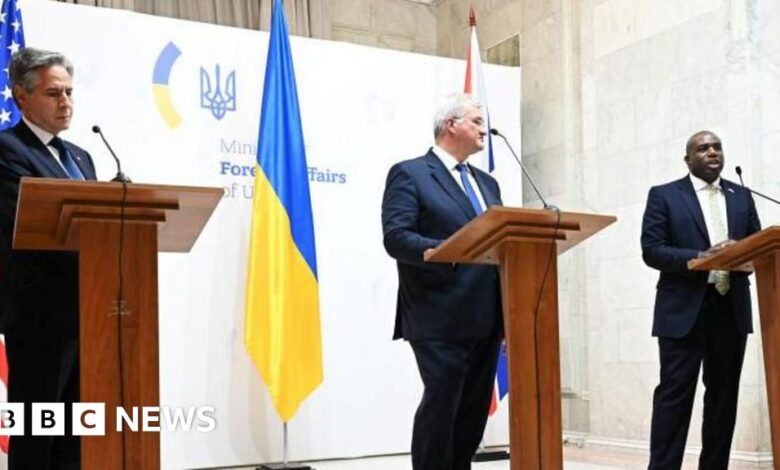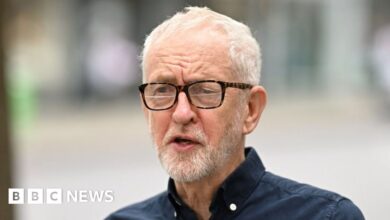Ukraine war: Lammy says Iran providing missiles to Russia changes debate

The delivery of Iranian missiles to Russia has changed the debate about Ukraine using Western-provided long-range missiles against targets inside Russia, UK Foreign Secretary David Lammy has told the BBC on a visit to Kyiv.
Lammy travelled to the Ukrainian capital with US Secretary of State Antony Blinken after talks in London.
They met President Volodymr Zelensky, who has repeatedly called for allies to loosen limits on the use of Western-supplied weapons.
The US and UK have not given Ukraine permission to use long-range missiles against targets inside Russia for fear of escalation.
At a news conference in Kyiv on Wednesday, Blinken said US President Joe Biden would likely discuss the use of long-range missiles with UK Prime Minister Sir Keir Starmer at the White House on Friday.
Asked about the risk of escalation, the US secretary of state added: “We’ve now seen this action of Russia acquiring ballistic missiles from Iran, which will further empower their aggression in Ukraine. So if anyone is taking escalatory action, it would appear to be Mr Putin and Russia.”
Lammy would not be drawn into whether the US and UK would be allowing Ukraine to use long-range missiles, but said: “I am not prepared to give Putin the advantage.”
Biden has said his administration is considering lifting the restrictions, but no decision has yet been made public.
On Wednesday, Zelensky said Kyiv’s victory in the war against Russia “depends mostly on the support of the United States”.
Ukrainian Foreign Minister Andrii Sybiha said steps towards lifting long-range missile restrictions “are important in the context of reports of a possible transfer of ballistic missiles to Russia by Iran”.
“We must act boldly,” he added.
In an interview with the BBC, Lammy said Iran providing Russia with ballistic missiles “clearly changes the debate” as they would allow Moscow’s forces “to have further penetration into Ukraine”.
“That is very dangerous,” Lammy said, adding: “As we see the Russians working with their partners, we see this transfer of ballistic missiles from Iran to Russia, it is important that we do more to support Ukraine to win in their efforts.”
On Wednesday, Lammy said the UK would provide £600m ($780m) in aid to Ukraine to support the country’s “humanitarian, energy and stabilisation needs”. Blinken announced a further $700m in assistance to Ukraine, including funding for the energy sector and demining.
The new aid came after the US, UK, France and Germany imposed further sanctions on Iran for supplying Russia with ballistic missiles for use in Ukraine. The UK government summoned Iran’s top diplomat over the accusations.
Ukrainian Prime Minister Denys Shmyhal thanked Lammy for the UK’s military support for Ukraine throughout the war.
But he added: “We hope that long-range equipment for strikes on the territory of our enemy will be reached and we will have it and we hope for your help and support in this issue.”
Asked by reporters on Tuesday if the US would lift restrictions on Ukraine’s use of long-range weapons, President Biden said his administration was “working that out now”.
Earlier this year, the US loosened some of the restraints, allowing Ukraine to use long-range missiles to strike areas along Russia’s border where troops are firing from.
Kyiv’s other allies have also been supplying some long-range weapons – with restrictions on how and when they can be used inside Russia, out of concern such strikes could prompt retaliation that draws Nato countries into the war or provokes a nuclear conflict.
The Kremlin said on Wednesday that Russia would respond “appropriately” if the US were to allow Ukrainian missile strikes on its territory.
During a visit to the UK before travelling to Kyiv, Blinken accused Iran of supplying short-range ballistic missiles to Russia, saying they could be deployed against Ukrainians within weeks. Lammy described Iran’s move as “a significant and dangerous escalation”.
The missiles are likely to boost Russia’s arsenal, enabling it to hit Ukrainian cities close to Russia’s borders or areas it already controls at the same time as it deploys its longer-range missiles deeper into Ukrainian territory.
Iran’s Foreign Minister Abbas Araghchi denied his country was supplying missiles to Russia, accusing Western countries of “acting on faulty intelligence and flawed logic”.




